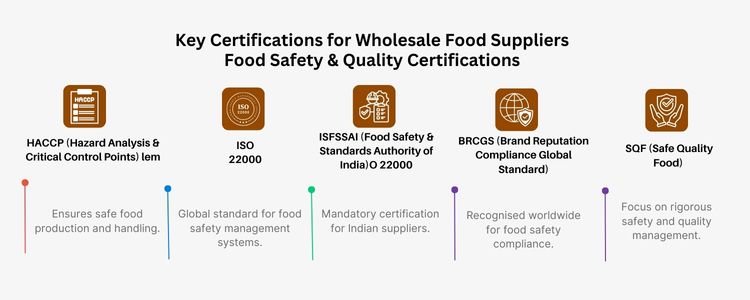Top Food Import Regulations to Know Before Selling in Australia and South Africa
The growth in international food trade has skyrocketed in recent years, and both Australia and South Africa are fast becoming destinations of choice for global exporters. Companies hoping to sell into these destinations will have to navigate a highly complex regulatory landscape. For wholesale food suppliers, complete regulatory compliance is not optional; compliance is the pathway to establishing a long-term, sustainable business relationship with importers, retailers and ultimately consumers.
This article will examine the critical food import regulations that entrepreneurs and businesses should be aware of before entering the Australian and South African markets. This article will also provide practical solutions to filing complaints with regards to the regulatory frameworks that will still be able to compete.
Food Import Landscape: Australia and South Africa
Australia and South Africa have some consistent food safety standards but both operate on non-interdependent food safety rule systems that rely on agricultural policy and what is of consumer safety importance to them.
Australia puts emphasis on biosecurity and consumer health, with numerous checks to ensure pests, diseases and unsafe food products do not enter the country.
South Africa is highly focused on transparency in labelling, product origin and adherence to food safety certifications.
For exporters and wholesale distributors, understanding these nuances is vital.
Key Food Import Regulations in Australia
Australia and South Africa have some consistent food safety standards but both operate on non-interdependent food safety rule systems that rely on agricultural policy and what is of consumer safety importance to them.
- Australia puts emphasis on biosecurity and consumer health, with numerous checks to ensure pests, diseases and unsafe food products do not enter the country.
- South Africa is highly focused on transparency in labelling, product origin and adherence to food safety certifications.
For exporters and wholesale distributors, understanding these nuances is vital.

Key Food Import Regulations in South Africa
- Foodstuffs, Cosmetics, and Disinfectants Act (FCD Act)
South Africa’s Department of Health is tasked with food imports under the FCD Act, given that imported products must meet local standards in terms of safety and hygiene among other issues. All food imports will be subject to inspection at the port of entry.
- Labeling and Packaging Norms
The DTIC requires full labeling including allergens, nutritional values, and country of origin. Depending on the location, bilingual or multilingual labeling may be encouraged for regions with multiple languages.
- Import Permits
Some categories of food, which includes food such as poultry, dairy and cereals, require specific import permits. These are only made available to products that meet sanitary or phytosanitary standards.
- Tariffs and Excise Duties
Each of South African’s import duties varies in product categories. The South African Revenue Service (SARS) provides further tariff schedules; these are used in pricing and planning profitability.
Common Challenges Faced by Exporters
- Documentation Pitfalls: Errors in documentation can result in shipment delay or shipment refusal.
- Regulatory Duplication: Dealing with various biosecurity, customs and food safety laws at the same time is often confusing for newcomers.
- High Compliance Costs: Regular inspections, permits and certifications generally increase operating expenses.
- Market-Specific Consumer Considerations: For example, Australian consumers prefer sustainably sourced goods, while South African consumers prefer affordability, in addition to quality.
Strategies for Compliance and Market Success
- Work with Established Import Agents
Engaging with your local specialists can minimize the chance of noncompliance and mistakes. Import agents generally have a good rapport with customs, which can improve clearance times.
- Integrate Compliance into Supply Chain
Systematically, from sourcing to packaging, suppliers should embrace compliance activities. This will reduce unnecessary delays should inspections be initiated.
- Certification
Use certifications (i.e., ISO 22000, HACCP, organic food label) to enhance legitimacy in both markets. If you plan to work with wholesale organic food distributors, such credentials could be game-changers.
- Develop a Long-Term Understanding of Market
Maintaining awareness of policy changes, tariffs, and any amendments to food safety guarantees can lead to a more competitive and compliant business.
Role of Wholesale Food Suppliers in Cross-Border Trade
Wholesale distributors act as the intermediary between exporters and retailers. For Wholesale Food Suppliers, adhering to regulations is one barrier they must overcome to expand their businesses overseas. They can only claim to be legitimate wholesalers if they provide a safe product, appropriately certified and in compliance with law. In Australia and South Africa, the authorities stress the importance of strict regulatory compliance when it comes to food imports and monitor their practices carefully.
Wholesale food products and organic vegetables suppliers offer solid demand for their products and are beginning to take advantage of these opportunities for compliant businesses.
Future Outlook for Food Imports
The worldwide food industry is progressing toward better transparency, sustainability, and digital compliance solutions. Australia and South Africa are investing in tech-based inspection systems, minimizing manual delays. Exporters that embrace these changes early such as digitizing documentation and implementing traceability systems will benefit from easier operations, as well as a better position in the market.
Conclusion
Selling food in Australia and South Africa requires product quality and compliance with various regulations. Exports to both Australia and South Africa will require compliance with biosecurity laws for Australia, labeling requirements for South Africa, and the need to build compliance into all elements of their strategy from the start. For Wholesale Food Suppliers, completing these activities and others to comply with regulations and addressing the impact on operations allows businesses to be compliant while taking into account future consumer and regulatory expectations. They can access these markets and create a sustainable position in the global food supply chain.
Frequently Asked Questions (FAQ)
Yes, for some types of food, there are regulations that require import permits from DAFF.
The DTIC checks that the food label is accurate, compliant with the nutritional disclosure, and has the country-of-origin labels in place.
Penalties can be fines, confiscation of goods and in some instances can even be bans on future imports.
Yes, you can’t guarantee that the supplier applies the same standards for the certifications beforehand so it can lead to rejection into the importing country.
Yes, Free Trade Agreements may relieve or remove tariffs as long as the goods comply with rules of origin.
Complete documentation, pre-approved permits and experienced import agents all can and do greatly reduce the risk of delays at customs.









